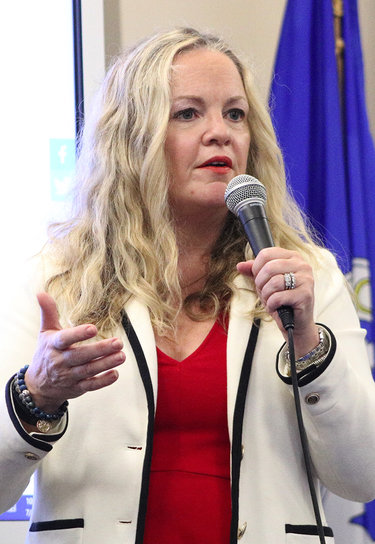‘Ripple effect’ for health and financial crises
ALBANY COUNTY — “Ripple effect” was a phrase used twice by Albany County Executive Daniel McCoy at his Tuesday morning briefing on COVID-19.
Once he was talking about the now-40 cases of the disease linked to a single Fourth of July weekend party on Hudson Avenue in Albany.
“You see the ripple effect of one party going forward,” said McCoy as he announced the 12 new cases of COVID-19 overnight in Albany County.
Since the county sheriff yesterday talked about compliance, McCoy said, the county has received reports of other illegal gatherings — no more than 50 people are supposed to congregate — including a fireworks display planned for Aug. 1 in Berne, he said.
The Berne event, however, is being promoted with instructions for attendees to follow public health protocols, including wearing masks and staying near their own vehicles.
The second time McCoy used the phrase was in relation to the economy as he noted the nation is in the throes of both a health crisis and a financial crisis.
Speaking of the Republican Senate’s proposal for the fifth federal stimulus package, McCoy, a Democrat, said, “If the state of New York doesn’t get bailed out, the governor is going to have to make tough decisions and it’s going to be a ripple effect.
“It’s going to come down to counties. Counties have to make tough decisions and it’s going to affect the way we do business for towns, cities, and villages … We’ll all be crying, I don’t want to say ‘bankruptcy,’ but close to it.”
McCoy noted that some mayors and supervisors are already laying off workers.
Governor Andrew Cuomo, also a Democrat, called it “pure politics” as he described, during his Tuesday conference call with the press, Republican Senators proposing a bill that has no state local aid funding.
“This is going to determine people’s property taxes,” said Cuomo. He also said, “If they don’t provide school aid — state aid — your school aid will be roughly 20 percent less of what it was.”
Cuomo called the Senate not providing state aid “totally hypocritical” because “their professed goal is to help the economy, create jobs, right?” He went on, citing several prominent economists and financial leaders, “Every economist says, if you do not provide state and local aid, you will hurt the economy.”
He referenced Harvard University economist Gabriel Chodorow-Reich, saying “that the stimulus, for every dollar in state spending that is cut, it hurts the overall economy by $1.50 to $2 dollars.”
“Mysterious illness”
“We have noticed our numbers in the last couple of weeks have been a little bit higher,” said Albany County Health commissioner Elizabeth Whalen on Tuesday morning.
Of the 57,397 rest results reported to New York State yesterday, 0.93 percent were positive, which Cuomo called “one of the lowest infection rates in the U.S.”
The Capital Region, of which Albany County is a part, had the second highest percentage at 1.2 percent. The highest was the Mohawk Valley at 2.0 percent. The lowest was the finger Lakes at 0.4 percent.
Whalen stressed the importance, particularly with the possibility of school reopenings on the horizon, of the community to continue to follow protocols of hand-washing, staying six feet from others, wearing masks, and not gathering in crowds.
Looking at the county’s COVID dashboard, Whalen noted that the ZIP code 12203, a densely-populated area that is partly in Albany and partly in Guilderland, continues to have the highest number of cases as it has since the start of the outbreak in March.
Of the county’s 124 COVID-9 deaths, the highest percentage, over 71 percent, were of people over the age of 75. Eighty-six percent of the Albany County residents who died from COVID-19 were white, and 12 percent were African Americans, said Whalen.
According to the United States Census Bureau, about 75.8 percent of Albany County residents are White and about 11.4 percent are African Americans.
Albany County now has 2,241 confirmed cases of COVID-19 with 854 residents under quarantine.
The five-day average for new daily positive cases is now down to 14.6 from 18 on Monday. There are currently 82 active cases, down from 87.
So far, 7,081 county residents have completed quarantine, while 2,159 of them have tested positive and recovered, an increase of 17.
Three county residents are now hospitalized, down from four yesterday, and one COVID-19 patient is in an intensive-care unit. The hospitalization rate has decreased to 0.13 percent from 0.17 percent.
Among the new positive cases reported Tuesday are two with close contacts to positive cases, three who had reported traveling out of state, and three who are health-care workers; four did not have a clear source of transmission.
“COVID is a very, very difficult and mysterious illness and we cannot predict based on who gets infected with COVID how serious the illness will become,” said Whalen. The likelihood, based on statistics, is that children and young adults will have a mild illness, she said.
“It is not something that we are willing to take a chance on so we continue to tell people to do what they need to do,” said Whalen. She noted that some young people have become seriously ill with the disease and some have succumbed.
In parts of the country where residents are not required to wear masks, Whalen said, they have been “burdened with more severe disease; hospital rates are higher; people have surge-capacity issues in states like Florida, Texas, and Arizona that are very real … The only way we can prevent that happening at this juncture is for people to follow the recommendations.”
Whalen concluded, “If we let our guard down, we will continue to see our numbers increase. We will likely see more severity of illness and we will likely see more hospitalizations and deaths.”



